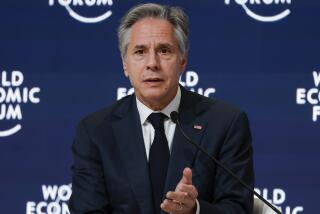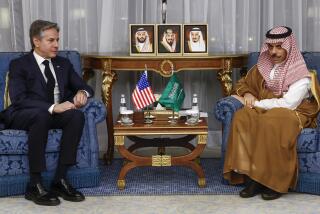U.S. Envoy to Talk Tough in Mideast, Albright Says
- Share via
WASHINGTON — Secretary of State Madeleine Albright said Tuesday that a senior U.S. official is taking to the Middle East a tough message demanding a new level of Israeli-Palestinian cooperation if the United States is to remain involved in the problem-plagued peace negotiations.
Middle East trouble-shooter Dennis B. Ross will deliver “a pretty hard-edged message about the realities of what is needed in order for us to play [a] role,” she said.
Speaking with members of The Times’ Washington Bureau, Albright said, “We have made clear . . . that we are at a very serious juncture, that there is the danger of the peace process falling apart . . . that we want to continue our constructive role, but this is not something that can be done if they do not provide us the wherewithal to do it.”
Ross left Tuesday for meetings in the region with Israeli Prime Minister Benjamin Netanyahu and Palestinian Authority President Yasser Arafat.
Ross’ trip and Albright’s comments follow a round of high-level diplomacy in Washington last week that failed to break the impasse that has gripped the peace process in recent months.
Albright called for “important steps by both sides” to demonstrate a willingness to press forward toward a final settlement.
“The Palestinians need to understand that Israelis can’t operate in an insecure environment . . . and the Israelis need to understand that taking actions which preempt some of the final-status issues makes it difficult for the Palestinians to negotiate,” she said.
Ross’ visit is his first trip to the Middle East since January, when he helped broker a long-delayed Israeli withdrawal from the West Bank city of Hebron.
Hopes that the Hebron agreement would help build the confidence needed for the two sides to tackle the most difficult issues, such as the status of Jerusalem, have been undermined by Palestinian attacks on Israelis and an Israeli government decision to build a new Jewish neighborhood in historically Arab East Jerusalem.
Israeli Foreign Minister David Levy and Arafat, attending a conference with European and Mediterranean delegates on Malta, turned down a chance Tuesday to hold face-to-face talks, despite the urging of Europeans.
Even amid this gloom, however, some observers believe there could be cause for cautious hope. The fact that the United States believes the process is now strong enough to withstand the sharp diplomatic nudge implied in Albright’s remarks constitutes at least limited progress, these observers believe.
Albright also sounded a cautious note of optimism, noting the lull in Palestinian attacks and news reports that Netanyahu was ready to delay until at least 2000 the construction of dwellings in the planned East Jerusalem project.
“These are the kinds of things that will make it possible for this [peace process] to move forward,” she said.
Later Tuesday, Albright announced at the U.S. Naval Academy in Annapolis, Md., that she will attend ceremonies on July 1 marking the hand-over of Hong Kong from British colonial authorities to the Chinese government.
Albright said China and its economy are changing rapidly but that the government’s repression of political dissent remains unchanged. But she defended the Clinton administration’s policy of engagement with Beijing, asserting that it would be pointless to try to isolate the world’s most populous nation.
Albright also indicated that the United States has no plans to take the lead in restoring political stability in Zaire or in determining the successor to the country’s tottering dictator, Mobutu Sese Seko.
More to Read
Sign up for Essential California
The most important California stories and recommendations in your inbox every morning.
You may occasionally receive promotional content from the Los Angeles Times.













